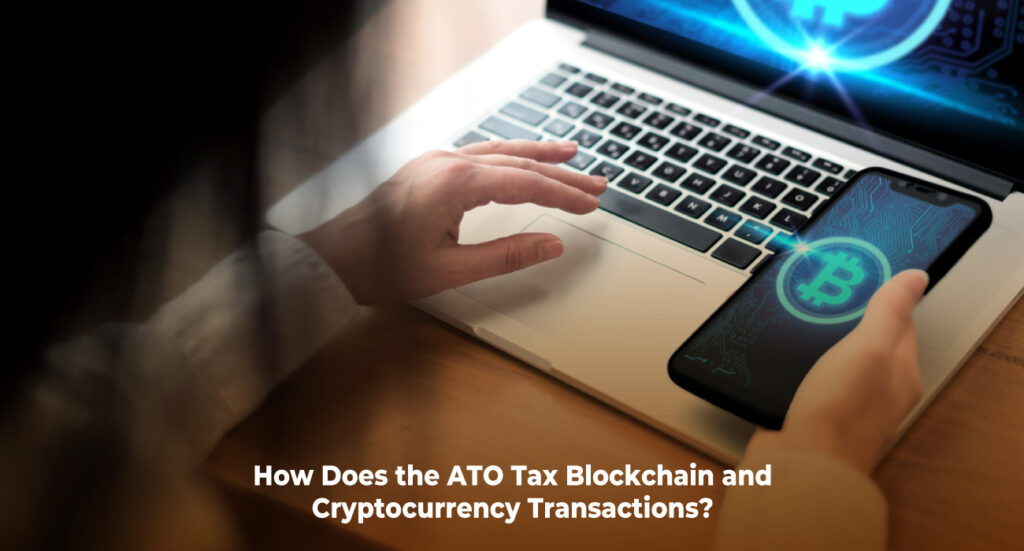The Rise of Blockchain and Cryptocurrency: How It’s Impacting Your Taxes in 2025
I thought we had covered blockchain and cryptocurrency taxation extensively in our articles—until one of our junior accountants pointed out a growing trend among our clients. More investors than ever are actively purchasing cryptocurrencies, and with the rapid evolution of blockchain technology in 2025, many are seeking clarity on the tax consequences of their digital asset holdings. As tax practitioners at Investax, we recognise that the expanding crypto economy presents both challenges and opportunities for investors. With the ATO increasing its scrutiny of digital assets, it is more important than ever for investors to understand their tax obligations, properly structure their crypto investments, and remain compliant to avoid unexpected tax liabilities.

What 2025 Looks Like for Blockchain and Cryptocurrency?
With increasing institutional interest, growing corporate adoption, and stronger market predictions, 2025 could be a game-changing year for blockchain and cryptocurrency.
According to a Fintech Magazine article and Digital Desk analysis, Bitcoin trading volume surged to US$19 trillion in 2024, more than double the US$8.7 trillion recorded in 2023. Experts believe that if even a small portion of the US$40 trillion in US retirement funds is invested in Bitcoin, its price could rise significantly. Geoffrey Kendrick, Head of Digital Assets Research at Standard Chartered Bank, predicts that Bitcoin could reach US$200,000 by the end of 2025.
At the same time, more businesses are investing in Bitcoin. According to Bernstein analysis, corporate Bitcoin holdings are expected to surpass US$50 billion in 2025, up from US$24 billion in 2024. Additionally, Galaxy Digital, a leading crypto asset manager, forecasts that assets in US spot Bitcoin ETFs will grow beyond US$250 billion.
Institutional investors are also increasing their exposure to Bitcoin. According to a recent article from The Motley Fool, institutions currently allocate about 1% of their portfolios to Bitcoin, but that percentage could easily double. BlackRock suggests that an optimal allocation to Bitcoin is 2%, while other investment firms, such as Fidelity, believe that some investors may benefit from an allocation as high as 5%.

Is Cryptocurrency, Including Bitcoin, Taxed Like a Foreign Currency?
No, Crypto Currency or Bitcoin is not considered a ‘foreign currency’ under Division 775 of the Income Tax Assessment Act 1997. This division sets out rules for how foreign currency gains and losses are taxed. If a taxpayer makes a gain from foreign currency, it will generally be included in their taxable income under this division, even if another tax rule could also apply—ensuring it’s only taxed once.

How Does the ATO Tax Blockchain and Cryptocurrency Transactions?
Cryptocurrency as a Barter Transaction (Business Use)
When a business receives cryptocurrency as payment for goods or services, or uses cryptocurrency to make business purchases, the ATO treats these transactions as barter arrangements. Businesses must report the Australian dollar value of the cryptocurrency received as part of their assessable income. Similarly, if a business pays for expenses using cryptocurrency, the value of the transaction is recorded in Australian dollars for tax purposes. The business may also be subject to GST and other tax implications, depending on the nature of the transaction.
Cryptocurrency as a Long-Term Investment (Capital Gains Tax – CGT)
For individuals who buy cryptocurrency like Bitcoin or Ethereum as a long-term investment, any profit made when selling the asset is subject to capital gains tax (CGT).
According to the ATO, any disposal of cryptocurrency can trigger a Capital Gains Tax (CGT) event. A disposal occurs in several situations, including when you:
- Sell a cryptocurrency asset
- Gift a cryptocurrency asset
- Trade, exchange, or swap one cryptocurrency asset for another
- Convert a cryptocurrency asset into Australian dollars or another fiat currency
- Use a cryptocurrency asset to purchase goods or services
In each of these cases, the ATO requires you to calculate and report any capital gain or loss as part of your tax obligations.
If the cryptocurrency is held for more than 12 months before being sold, the investor may be eligible for a 50% CGT discount. However, losses from selling cryptocurrency at a lower price than the purchase cost can be used to offset other capital gains. Investors should maintain records of their purchase and sale prices, dates, and associated costs for tax reporting.
Cryptocurrency Trading (Business or Share Trader Approach)
If a taxpayer frequently buys and sells cryptocurrency as part of a business or trading activity, their gains and losses are treated as ordinary income rather than capital gains. Similar to share traders, any profit from selling cryptocurrency is taxed as business income, and losses may be deductible against other taxable income. The ATO considers factors such as trading volume, frequency, and intent to determine whether an individual is classified as an investor (CGT applies) or a trader (income tax applies).

How Do You Value Cryptocurrency in Australian Dollars?
The ATO requires you to know the value of your cryptocurrency assets to determine whether you’ve made a capital gain or loss when a CGT event occurs.
To calculate the value of your crypto assets at the time of acquisition or disposal, you must convert their value into Australian dollars. Since 1 January 2020, the ATO has adopted the exchange rates provided by the Reserve Bank of Australia (RBA). If you need daily foreign exchange rates, you can refer to the RBA’s Exchange Rates. For currencies not listed by the RBA, you may use any reasonable externally sourced exchange rate.

How to Manage Cryptocurrency Tax in a Trust Structure
Managing cryptocurrency tax in a trust structure requires careful planning to ensure compliance with tax laws while maximising benefits for beneficiaries. In Australia, cryptocurrencies held within a trust are treated as trust assets, and any income or capital gains generated from trading, staking, or selling digital assets must be distributed to beneficiaries or retained within the trust. If distributed, the beneficiaries are responsible for reporting and paying tax on their share of the trust’s income. Proper record-keeping is essential, including details of transactions, purchase prices, disposal dates, and any associated costs.
Ensure the Trading Platform is registered using either the Trust or Trustee details. We have seen many people use their personal account to trade using the trust money. This is not compliant with the ATO.

How to Manage Cryptocurrency Tax in an SMSF
Managing cryptocurrency tax within a self-managed super fund (SMSF) requires strict compliance with superannuation and tax laws to ensure the fund remains compliant with the Australian Taxation Office (ATO) and the Superannuation Industry (Supervision) Act 1993 (SIS Act). In an SMSF, cryptocurrencies are treated as fund assets, and any income or capital gains from trading, staking, or selling digital assets must be reported as part of the fund’s investment earnings. Since SMSFs operate under a strict investment strategy, trustees must ensure that cryptocurrency investments align with the fund’s sole purpose test, which requires that all investments be made for the sole benefit of members’ retirement savings.
Similar to a Trust structure, it is crucial to ensure that the trading account is registered in the SMSF’s name rather than under the personal name of a trustee or member. Using personal accounts to trade crypto on behalf of the SMSF is a serious compliance breach and could lead to penalties or even the fund losing its complying status. Proper record-keeping is also critical, including details of all transactions, purchase prices, disposal dates, and any associated costs. Trustees should regularly review their investment strategy and seek professional advice to ensure compliance with SMSF regulations while optimising tax outcomes.
Conclusion
It is crucial for cryptocurrency investors to be more prudent about purchasing assets in the right investment structure. You might be investing a small amount each year, but with the growth of blockchain technology and its increasing acceptance in mainstream outlets, you could eventually become a major crypto investor. Building an asset portfolio within the right structure can make or break your tax planning.
Understanding how the ATO classifies, and taxes digital assets is essential to ensure compliance and avoid unexpected tax liabilities. Whether you are a long-term investor, an active trader, or managing cryptocurrency within a trust or SMSF, having a clear tax strategy is crucial. At Investax, our tax specialists can help you structure your crypto investments effectively, maximise tax benefits, and ensure full compliance with Australian tax laws. Contact Investax today to speak with our expert team and get personalised tax advice tailored to your needs.
General Advice Warning
The material on this page and on this website has been prepared for general information purposes only and not as specific advice to any particular person. Any advice contained on this page and on this website is General Advice and does not take into account any person’s particular investment objectives, financial situation and particular needs.
Before making an investment decision based on this advice you should consider, with or without the assistance of a securities adviser, whether it is appropriate to your particular investment needs, objectives and financial circumstances. In addition, the examples provided on this page and on this website are for illustrative purposes only.Although every effort has been made to verify the accuracy of the information contained on this page and on our website, Investax Group, its officers, representatives, employees and agents disclaim all liability [except for any liability which by law cannot be excluded), for any error, inaccuracy in, or omission from the information contained in this website or any loss or damage suffered by any person directly or indirectly through relying on this information.
Reference
Taxation Determination – TD 2014/25





